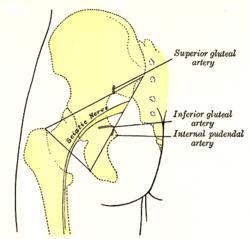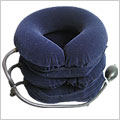Sciatica - To avoid mistakes and choose the right treatment
by matthew schwarzer
If you found this site it is most likely that you, or someone close to you, are suffering from sciatica. To be honest, this is very unfortunate because of the severe pain involved, but there is already light at the end of the tunnel.
 To be exact, sciatica is not the diagnosis of a medical condition but rather a set of symptoms evolving around neck, back and even leg pain which mostly is caused by general compression and/or irritation of the sciatic nerve or its roots. Patients can feel pain in the lower back, buttocks and even their legs and feet. Additionally, there might occur numbness, muscular weakness and diminished motoric skills in the affected body parts. It is symptomatic for sciatica to be felt on one side of the body only.
To be exact, sciatica is not the diagnosis of a medical condition but rather a set of symptoms evolving around neck, back and even leg pain which mostly is caused by general compression and/or irritation of the sciatic nerve or its roots. Patients can feel pain in the lower back, buttocks and even their legs and feet. Additionally, there might occur numbness, muscular weakness and diminished motoric skills in the affected body parts. It is symptomatic for sciatica to be felt on one side of the body only.
Another cause is spinal stenosis wherein the spinal canal, through which the spinal cord runs, narrows and thus applies pressure on the sciatic nerve, its roots or the spinal cord itself. There are several possible reasons for a narrowing of the spinal canal including but not limited to inflammation, vertebral dislocation or a slipped disc.
Sciatica may also be caused by the piriformis syndrome where the sciatic nerve runs through the priformis muscle instead of below it. Trauma can cause the muscle to spasm or shorten resulting in pressure on the sciatic nerve.
Trauma can also directly lead to a compression of the sciatic nerves. This is typically for car accidents or sports injuries where excessive forces lead to nerve damage or bone fractures compressing the sciatic nerve.
Poor posture and bad habits are a widely underestimated cause of sciatica. Over time, they can lead to a misalignment of the sacral vertebrates and to a compression of the sciatic nerve or its roots.
The most common treatment options are:
Where does your sciatica come from and what actually is sciatica?
Possible causes for sciatica
One cause of sciatica is lumbar bulging and spinal disc herniation, inappropriately also referred to as “slipped disc”. Lumbar bulging means the soft inner part of the intervertebral disc bulges out and causes the outer, fibrous ring to compress the sciatic nerve (roots). If the pressure is too strong, the outer ring of the disc can tear and soft inner part can leak out leading to a spinal disc herniation. Lumbar bulging and spinal disc herniation will both lead to severe pain, if the sciatic nerve or its roots are compressed. On the other hand, the tear in the fibrous ring alone can cause an inflammatory reaction, which also in results in severe pain, even if the sciatic nerve is not compressed.Another cause is spinal stenosis wherein the spinal canal, through which the spinal cord runs, narrows and thus applies pressure on the sciatic nerve, its roots or the spinal cord itself. There are several possible reasons for a narrowing of the spinal canal including but not limited to inflammation, vertebral dislocation or a slipped disc.
Sciatica may also be caused by the piriformis syndrome where the sciatic nerve runs through the priformis muscle instead of below it. Trauma can cause the muscle to spasm or shorten resulting in pressure on the sciatic nerve.
Trauma can also directly lead to a compression of the sciatic nerves. This is typically for car accidents or sports injuries where excessive forces lead to nerve damage or bone fractures compressing the sciatic nerve.
Poor posture and bad habits are a widely underestimated cause of sciatica. Over time, they can lead to a misalignment of the sacral vertebrates and to a compression of the sciatic nerve or its roots.
Sciatica: To treat or not to treat?
First of all you need to find out if sciatica is the cause of your symptoms. The term itself only describes a set of symptoms and not the cause of the pains which has to be located exactly before any treatment starts. Seek out a doctor who in turn will diagnose you and find out what the best treatment plan for your case is. Although sciatica is a common form of neck, back and leg pain there is no easy, instant remedy. However, the good news is that in most cases sciatica only lasts between 6 and 12 weeks.The most common treatment options are:
- Anti-inflammatory medications such as Aspirin and Ibuprofen to bring down the inflammation and reduce the pain
- Non surgical spinal decompression (e.g. with a neck traction device)
- Chriropratic
- Exercises
- Physiotherapy
- Better posture
- Surgery (Only in severe cases where the sciatica lasts longer than usual).


 Products
Products
 ChiSoft Neck Traction Deluxe
ChiSoft Neck Traction Deluxe



